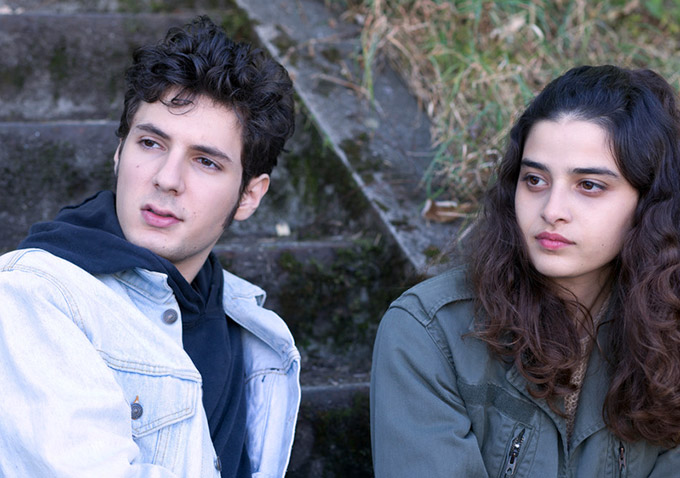The original French title of “Parisienne” is “Peur de Rien,” which literally translated means “Fear of Nothing.” And in the first few moments of the film, young Lina (Manal Issa) shows both remarkable bravery and deserved terror. She is a college student who has just moved from Beirut to the Parisian suburbs in 1993, and shortly after arriving at her aunt’s home, her uncle (Waleed Zuaiter) attempts to rape her. She fights back fiercely, fleeing into the uncertain night. “Parisienne” captures her fear as she runs through the dark streets, a triumph of both the actress’ performance and cinematographer Hélène Louvart‘s work.
READ MORE: The 30 Most Anticipated Films Of The 2016 Sundance Film Festival
What follows could have been another coming-of-age drama about a young woman finding herself, her intellect and her sexuality in the city, except for two important elements that set the film apart: Lina’s status as a new immigrant and a rare gem of a turn from newcomer Issa. Like Lina, director Danielle Arbid left Lebanon for Paris to study, and “Parisienne” feels achingly personal at times. Lina’s struggles vary, from bureaucratic ones like missing documents to prejudice from those she meets, but her status as an immigrant seems to tinge every aspect of her new life. Isolation and limited options dominate her days. Arbid’s drama takes a compassionate approach to its heroine, cheering her on in her moments of triumph and suffering along with her when she experiences letdowns.
In portraying Lina’s responses to these challenges, Issa alternates between being inspiringly rock hard and heartbreakingly brittle. She’s bold in her choices, but she feels overwhelmed when her options are limited. Issa’s eyes communicate defiance and vulnerability, and the audience never wants to look away. “Parisienne” is singular in its focus on her, and the film is the better for it. Throughout the film men comment on her appearance, from her uncle to various lovers, and while Issa is empirically stunning, she radiates more than just physical beauty. There’s strength and spirit evident each time the camera lights on her face.
READ MORE: Check Out This Infographic Guide To French Cinema History
After leaving her aunt and uncle’s home, Lina finds it difficult to secure both a place to live and a job. She bounces from bed to bed, as each living situation deteriorates. Similarly, her jobs are rarely stable, given her status as a student and how that complicates her ability to work legally as an immigrant. Though she often bristles when men comment on how beautiful she is, Lina connects with several lovers, each in different ways. She meets older Jean-Marc (Paul Hamy) at a club, and he shows her that there may be more to romantic relationships than she has experienced in the past. Julien (Damien Chapelle) shuns traditional education, but teaches her about his favorite music and takes her to a Frank Black show. But where she really thrives is in school, where she quickly switches her major from economics to art history and comparative literature after taking a class focused on ugliness taught by Madame Gagnebin (a charming Dominique Blanc). She is engaged by the material, and the connection with the professor leads to additional opportunities as she attempts to make a life in France.
Arbid co-wrote the script with Julie Peyr, and it runs a bit long in telling its story of Lina. There’s some repetition in the obstacles she faces, which can feel tedious though it does demonstrate the pervasive challenges of her experience as an immigrant. Even though Peyr recently worked on the reflective drama “My Golden Days” with Arnaud Desplechin and this film is set in the ‘90s, it doesn’t feel nostalgic. Instead, it feels current and vital. There are references to its setting, particularly in music and fashion, but none of the details make the film feel truly dated. Lina’s day-to-day life could easily be translated to the present, particularly given the current political climate.
“Parisienne” should appeal to fans of last year’s French Oscar nominee “Mustang,” for its celebration of female spirit in the face of undeserved prejudice. Like the five heroines in Deniz Gamze Ergüven’s film, Arbid’s Lina struggles and often earns the audience’s admiration for her response. This is less lively in tone than that film, but there’s still energy in Lina’s moments of joy and ferocity. Another entry at this year’s Rendez-Vous with French Cinema, Jacques Audiard’s “Dheepan” (reviewed at Cannes) also addresses the immigrant experience in the country, an undeniably timely subject given the surge in immigrants and refugees to the continent. Despite their differences, what both of these films have done well is show the humanity of immigrants and refugees as a whole by focusing on a single person. It’s a needed call for empathy when much of the political rhetoric is crying for fear. [B]





